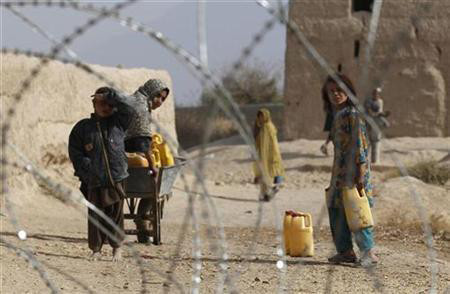By David Ljunggren
OTTAWA (Reuters) - Opposition legislators blasted the Canadian government on Monday after it emerged that Canadian soldiers in Afghanistan captured children suspected of working with the Taliban and then handed them over to an Afghan security unit alleged to have abused prisoners.

Afghan children look from behind a razor wire at an outpost in Zhari district in Kandahar Province, Afghanistan November 20, 2010. (Photo: REUTERS/Peter Andrews)
The revelations are the latest blow to Canada's increasingly unpopular combat mission in southern Afghanistan, which is due to end next year.
The question of Afghan detainees -- and whether Canadian soldiers knew they might be abused -- has been one of the most difficult issues for the minority Conservative government since it took power in early 2006.
The Defense Department said some child detainees were handed over to Afghanistan's National Directorate of Security (NDS), stressing that no transfers would take place if Canadian officers felt there was any risk of torture.
Last year a Canadian diplomat said that as early as 2006, he had sent reports indicating the NDS was abusing detainees.
Opposition members of Parliament pressed the government in the House of Commons over what the soldiers had done.
"The Canadian government knew perfectly well that the NDS practiced torture. Why did Canada transfer child prisoners to the Afghan NDS torturers?" asked Thomas Mulcair, deputy leader of the left-leaning New Democrats.
"How many children were arrested? How many children were transferred? How many children were tortured?"
Foreign Minister Lawrence Cannon did not directly answer the questions, while noting that Canada and Afghanistan had an agreement allowing Canadians to monitor prisoners.
A briefing document sent to Defense Minister Peter MacKay in March said Afghan authorities were now sending child prisoners to a separate juvenile rehabilitation center rather than housing them in an NDS-run prison in Kandahar.
A Defense Department spokeswoman said the Taliban were known to forcibly recruit those under 18 and train them to become fighters or suicide bombers.
"Should it be determined that a juvenile detainee poses a real and substantial risk to the Canadian Forces and our allies, they are transferred ... to the National Directorate of Security," she said.
Canadian commanders do not transfer prisoners if there is "a real risk that the detainee would be in danger of being subjected to torture", she added.
The briefing document for MacKay -- obtained by the Canadian Broadcasting Corp under access to information laws -- said some children had been in "Canadian Forces custody for a significant period". The exact amount of time, as well as the number of children, was deleted.
Canada has around 2,800 troops in the southern Kandahar region, and has so far lost 153 servicemen and women. Once the combat mission ends next year, about 950 soldiers will stay behind until 2014 to help train Afghan forces.
(Reporting by David Ljunggren; editing by Rob Wilson)



